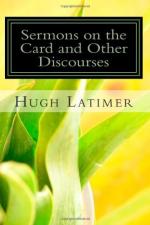Let it be admitted for the probation of this, that it might please the king’s grace now being to accept into his favour a mean man, of a simple degree and birth, not born to any possession; whom the king’s grace favoureth, not because this person hath of himself deserved any such favour, but that the king casteth this favour unto him of his own mere motion and fantasy: and for because the king’s grace will more declare his favour unto him, he giveth unto this said man a thousand pounds in lands, to him and his heirs, on this condition, that he shall take upon him to be the chief captain and defender of his town of Calais, and to be true and faithful to him in the custody of the same, against the Frenchmen especially, above all other enemies.
This man taketh on him this charge, promising his fidelity thereunto. It chanceth in process of time, that by the singular acquaintance and frequent familiarity of this captain with the Frenchmen, these Frenchmen give unto the said captain of Calais a great sum of money, so that he will but be content and agreeable that they may enter into the said town of Calais by force of arms; and so thereby possess the same unto the crown of France. Upon this agreement the Frenchmen do invade the said town of Calais, alonely by the negligence of this captain.
Now the king’s grace, hearing of this invasion, cometh with a great puissance to defend this his said town, and so by good policy of war overcometh the said Frenchmen, and entereth again into his said town of Calais. Then he, being desirous to know how these enemies of his came thither, maketh profound search and inquiry by whom this treason was conspired. By this search it was known and found his own captain to be the very author and the beginner of the betraying of it. The king, seeing the great infidelity of this person, dischargeth this man of his office, and taketh from him and from his heirs this thousand pounds of possessions. Think you not that the king doth use justice unto him, and all his posterity and heirs? Yes, truly: the said captain cannot deny himself but that he had true justice, considering how unfaithfully he behaved him to his prince, contrary to his own fidelity and promise. So likewise it was of our first father Adam. He had given unto him the spirit of science and knowledge, to work all goodness therewith: this said spirit was not given alonely unto him, but unto all his heirs and posterity. He had also delivered him the town of Calais; that is to say, paradise in earth, the most strong and fairest town in the world, to be in his custody. He nevertheless, by the instigation of these Frenchmen, that is to say, the temptation of the fiend, did obey unto their desire; and so he brake his promise and fidelity, the commandment of the everlasting King his master, in eating of the apple by him inhibited.
Now then the King, seeing this great treason in his captain, deposed him of the thousand pounds of possessions, that is to say, from everlasting life in glory, and all his heirs and posterity: for likewise as he had the spirit of science and knowledge, for him and his heirs; so in like manner, when he lost the same, his heirs also lost it by him and in him. So now this example proveth, that by our father Adam we had once in him the very inheritance of everlasting joy; and by him, and in him, again we lost the same.




